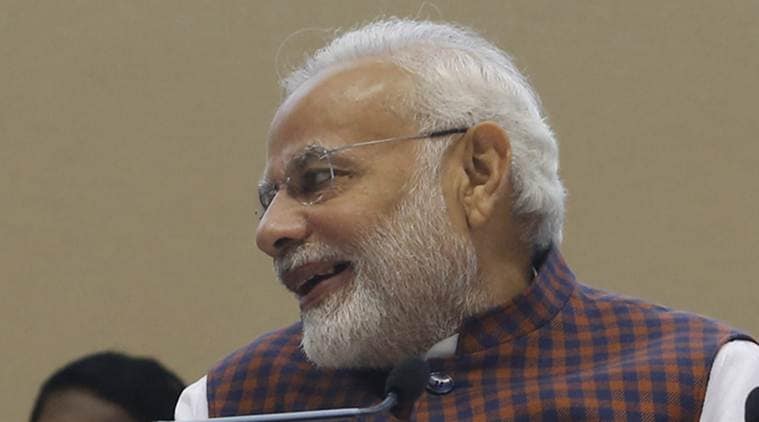 Prime minister Narendra Modi at silver jubilee foundation day function of NHRC in New Delhi. (Express photo by Anil Sharma)
Prime minister Narendra Modi at silver jubilee foundation day function of NHRC in New Delhi. (Express photo by Anil Sharma)
Highlighting his government’s campaign for the welfare of the girl child, Prime Minister Narendra Modi on Friday said that the sex ratio has improved in several states due to the ‘Beti Bachao, Beti Padhao’ programme.
Speaking at the silver jubilee foundation day of the National Human Rights Commission (NHRC), Modi said, “There were questions over daughters’ right to life. A section of society with narrow-minded people considered daughters unwanted and killed them in the womb. Today I can proudly say that with ‘Beti Bachao Beti Padhao’ campaign, there has been a rise in number of girls (improved sex ratio) in Haryana, Rajasthan and many other states.”
He said, “Many innocents have got rights. The meaning of life is not only to live, but live it with dignity.”
Pointing out that the government has increased the maternity leave period from 12 weeks to 26 weeks, Modi said, “We have, in a way, protected the right of a newborn so that her/his mother can stay with the kid for six months. This is a big step,” he said, adding that even many progressive countries are yet to implement this.
The BJP-led NDA government of Prime Minister Modi started the ‘Beti Bachao Beti Padhao’ campaign to curb female infanticide and promote education of girl children. The Prime Minister said he is hopeful that the triple talaq Bill will be passed by Parliament. The Bill is pending before Rajya Sabha after the Lok Sabha passed it.
Modi also hailed the Ayushmaan Bharat health insurance scheme and claimed that 50,000 people have benefited from it within two-and-a-half weeks of its launch. Through legislation, he said, steps have been taken to ensure that HIV-positive patients do not suffer any kind of discrimination and get equal treatment.
Modi said the word “divyang” — used for the specially abled — has attained respect, and noted that special provisions have been made for them at government buildings, railway stations, and at airports.
He said the NHRC has an important role to play in the government’s efforts to achieve sustainable development goals. Protection of human rights has been an important part of Indian culture, he asserted. Modi noted that after Independence, elements such as an independent and impartial judiciary, an active media, an active civil society, and organisations such as NHRC are in place to protect human rights. He mentioned steps taken to improve ease of access to justice, such as increasing the number of e-courts, and strengthening of the National Judicial Data Grid.
He described Aadhaar as a technology-based empowerment initiative.
Modi also said that the period of Emergency between 1975 and 1977 was a blot on human rights in the country, with lakhs of people put behind bars. “In that dark period of Emergency, even the Right to Life was stripped, what can you say about (other) rights? But Indians again achieved human rights through their own efforts,” Modi said.